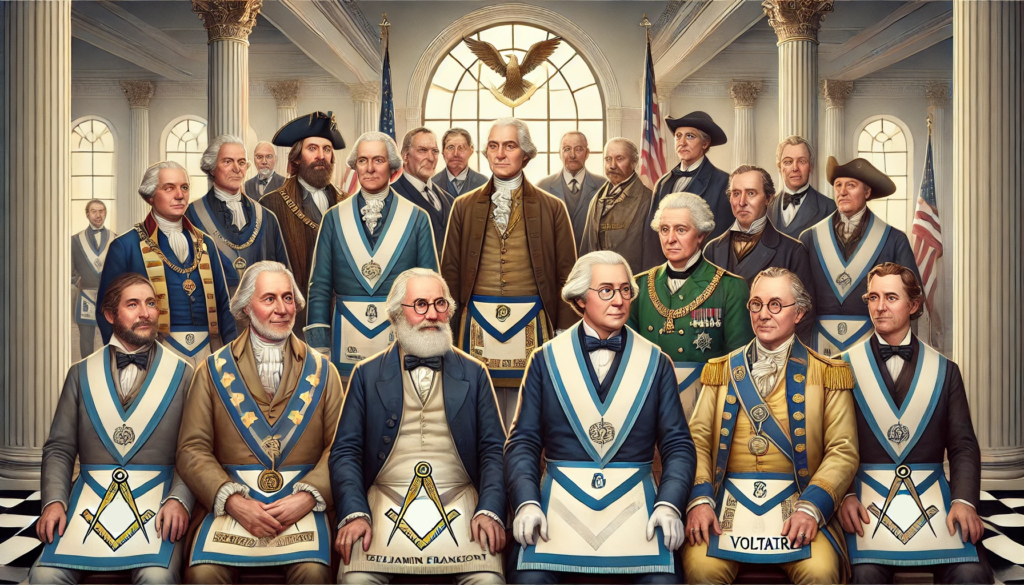Freemasonry has been a significant part of society for centuries, bringing together men of character and influence from all walks of life. Throughout history, many Freemasons have made remarkable contributions to the arts, sciences, politics, and social movements. In this blog post, we’ll explore ten famous Freemasons whose legacies have left an indelible mark on the world.

1. George Washington (1732–1799)
Occupation: First President of the United States
Masonic Involvement:
George Washington is perhaps the most renowned Freemason in history. Initiated into Freemasonry in 1752 at the Fredericksburg Lodge in Virginia, he remained an active member throughout his life. Washington valued the principles of Freemasonry, which aligned with his beliefs in liberty, equality, and fraternity. His Masonic apron and other artifacts are still preserved as symbols of his commitment to the fraternity.
Contributions:
As the first President of the United States, Washington played a pivotal role in the founding of the nation. His leadership during the American Revolutionary War and his guidance in shaping the new government established a legacy of democracy and republicanism.
2. Benjamin Franklin (1706–1790)
Occupation: Founding Father, Inventor, Diplomat
Masonic Involvement:
Initiated in 1731 at St. John’s Lodge in Philadelphia, Benjamin Franklin became a prominent Freemason, eventually serving as the Grand Master of Pennsylvania. His Masonic activities extended internationally, strengthening fraternal ties between American and European lodges.
Contributions:
Franklin was a polymath whose inventions and writings influenced various fields. As a statesman, he was instrumental in securing French support during the American Revolution and contributed to the drafting of the Declaration of Independence and the U.S. Constitution.
3. Wolfgang Amadeus Mozart (1756–1791)
Occupation: Composer and Musician
Masonic Involvement:
Mozart joined the Masonic lodge Zur Wohltätigkeit (“Beneficence”) in Vienna in 1784. Freemasonry significantly influenced his music, with several compositions containing Masonic themes and symbolism, such as “The Magic Flute” and “Masonic Funeral Music.”
Contributions:
One of the greatest composers in Western music history, Mozart’s works span symphonies, operas, chamber music, and concertos. His innovative compositions have had a lasting impact on classical music.
4. Sir Winston Churchill (1874–1965)
Occupation: British Prime Minister, Statesman, Writer
Masonic Involvement:
Churchill was initiated into Studholme Lodge No. 1591 in London in 1901. Although his active participation waned due to his political career, he maintained an appreciation for Masonic principles throughout his life.
Contributions:
As the Prime Minister of the United Kingdom during World War II, Churchill’s leadership was crucial in the fight against Nazi Germany. His oratory skills and steadfast determination inspired the British people during their darkest hours.
5. Voltaire (1694–1778)
Occupation: Writer, Philosopher
Masonic Involvement:
Voltaire was initiated into Freemasonry shortly before his death in 1778 at the Lodge of the Nine Sisters in Paris. His induction was a significant event, attended by notable intellectuals of the time.
Contributions:
A leading figure of the Enlightenment, Voltaire’s writings advocated for civil liberties, freedom of religion, and separation of church and state. His works challenged established institutions and promoted reason and justice.
6. John Hancock (1737–1793)
Occupation: Merchant, Statesman
Masonic Involvement:
John Hancock was an active Freemason in the St. Andrew’s Lodge in Boston. His Masonic associations connected him with other influential figures in the American Revolution.
Contributions:
Best known for his bold signature on the Declaration of Independence, Hancock was a prominent patriot who served as President of the Second Continental Congress and Governor of Massachusetts.
7. Franklin D. Roosevelt (1882–1945)
Occupation: 32nd President of the United States
Masonic Involvement:
Initiated into Holland Lodge No. 8 in New York City in 1911, Roosevelt was a lifelong Freemason. He participated in Masonic events and saw the fraternity as a means to promote unity and charity.
Contributions:
FDR led the United States through the Great Depression and World War II. His New Deal policies aimed to revive the economy, and his leadership during the war was instrumental in the Allied victory.
8. Mark Twain (Samuel L. Clemens) (1835–1910)
Occupation: Writer, Humorist
Masonic Involvement:
Mark Twain was initiated into Polar Star Lodge No. 79 in Missouri in 1861. His Masonic membership reflected his interest in the philosophical and moral teachings of the fraternity.
Contributions:
Twain’s novels, including “The Adventures of Tom Sawyer” and “Adventures of Huckleberry Finn,” are classics of American literature. His wit and social commentary continue to influence writers and readers alike.
9. Theodore Roosevelt (1858–1919)
Occupation: 26th President of the United States
Masonic Involvement:
Theodore Roosevelt was initiated into Matinecock Lodge No. 806 in New York in 1901. He saw Freemasonry as a platform for promoting civic responsibility and ethical conduct.
Contributions:
Roosevelt was a progressive leader known for his conservation efforts, including establishing national parks and forests. His foreign policy and domestic reforms shaped modern American governance.
10. Duke Ellington (1899–1974)
Occupation: Composer, Pianist, Bandleader
Masonic Involvement:
Duke Ellington was a member of Prince Hall Freemasonry, an African-American branch of Freemasonry. His involvement reflected his commitment to community and artistic expression.
Contributions:
A pivotal figure in the history of jazz, Ellington composed thousands of pieces that expanded the boundaries of the genre. His music and leadership influenced generations of musicians.
These ten individuals represent just a fraction of the many Freemasons who have contributed significantly to society. Their lives exemplify the Masonic values of integrity, brotherhood, charity, and personal growth. By exploring their stories, we gain insight into how Freemasonry has helped shape history through the actions of its members.
Interested in Joining or Learning More?
If you’re inspired by the legacies of these famous Freemasons and wish to learn more about how Freemasonry can enrich your life, we invite you to reach out to Welcome Lodge 3779. Contact us for more information.
